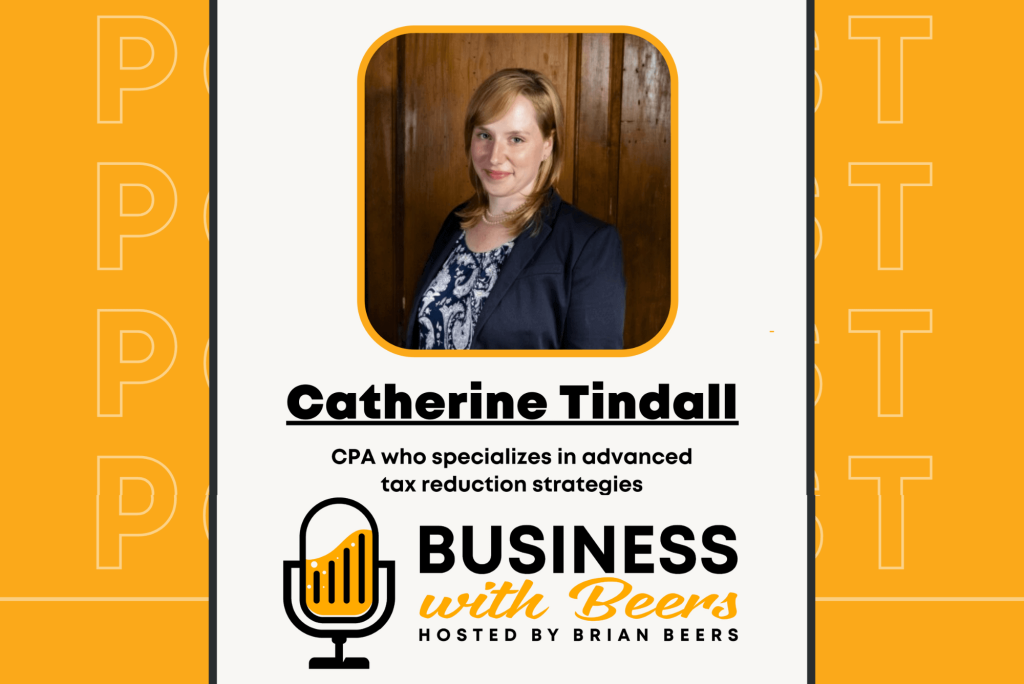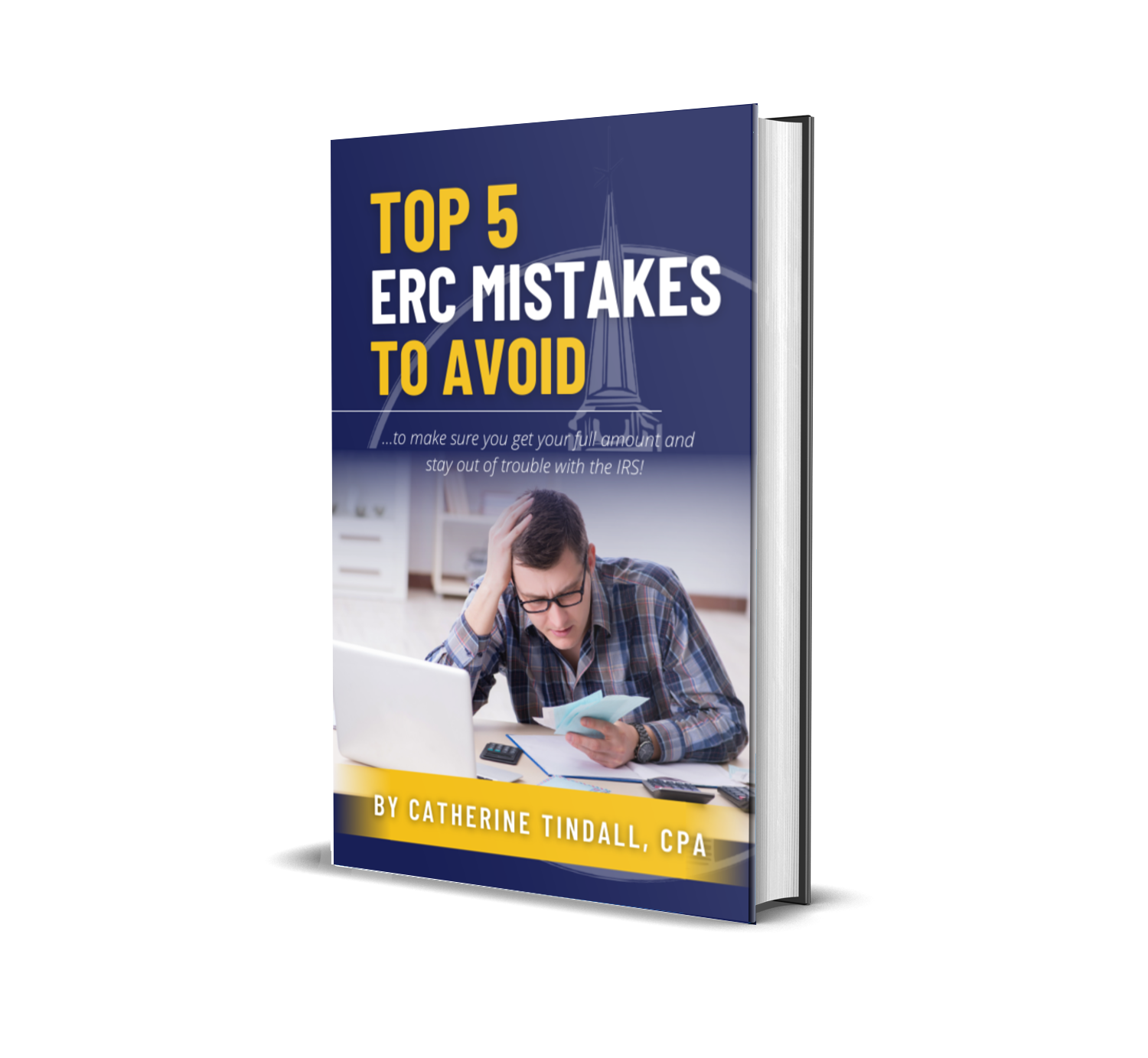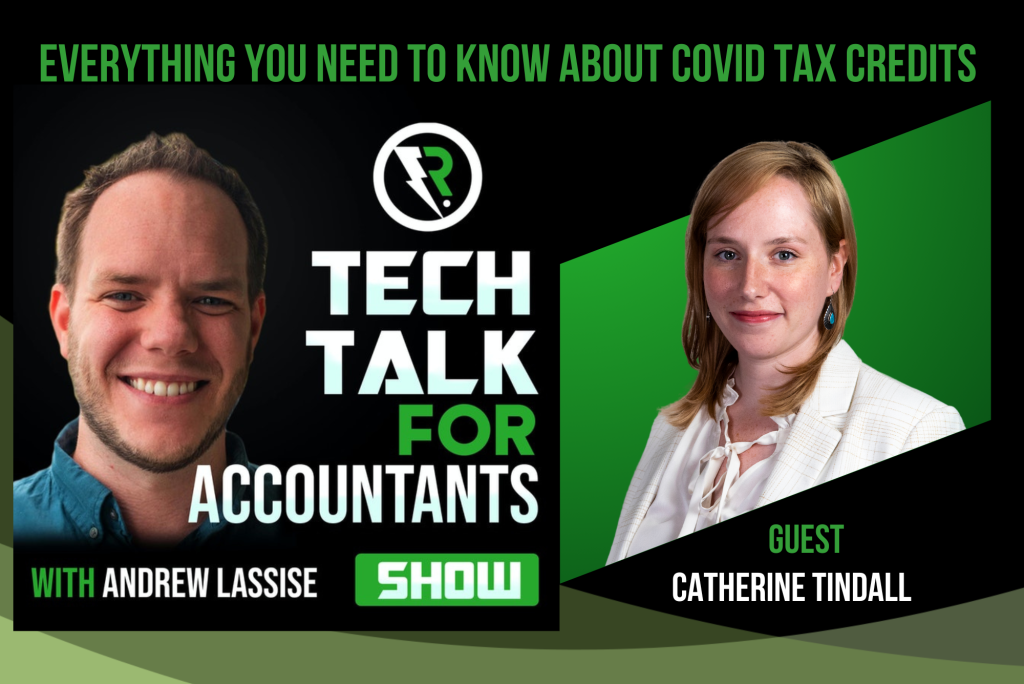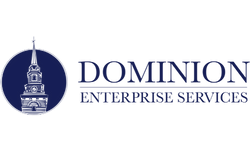
Business with Beers
0:00 INTRO
Welcome to the Business with Beers Podcast. This is the place where we help entrepreneurs turn their business income into passive income. I’m your host Brian Beers, an entrepreneur on a mission to inspire growth from everyone around me. I’m going to show you how to create generational wealth by growing your business and breaking the chains of Wall Street investing. Remember, you need to take the actions that others won’t, to live the life that others don’t.This week I’ve got an amazing show with Catherine Tindall, a CPA who specializes in advanced tax reduction strategy through government credits and proactive planning. While COVID may be in our rearview mirror there’s still an opportunity for business owners to claim the employment retention tax credit or ERTC for short. This credit is for employers affected by shutdowns in 2020 and 2021 who retained their employees. These credits can be significant and in this episode Catherine gets into the qualifications and potential credit amounts. Towards the end, we also get into some strategies on reducing your taxable income by converting active business into passive business activities and then using passive losses through real estate to offset that income. So tons of great content, make sure you grab a pen and pencil for some of those parts we get into some technical things. If you enjoy this episode please share it with your friends,rate and review with your favorite part to allow us to reach more people.
01:32 Brian Beers
Welcome to the show, Catherine!
01:35 Catherine Tindall
Thanks for having me, Brian!
1:38 Brian
Awesome! Can you give us a little bit of your journey for maybe 18 years old to where and how your business and career has developed?
1:45 Cath
I originally wanted to go into medicine because I had a strong desire for my daily work experience to be helping other people. As I started to pursue that, I found that it was not going to be the best fit for that desire. My parents actually had a tax practice when I was growing up, being the rebellious kid I’ve declared that I was never gonna go into accounting. ‘Cause it was too boring but if you’re listening, you already know that I’m a CPA, you can see where that ended up. I think my love for accounting started with my first accounting class and then more specifically my love for tax came from a combination of really enjoying the problem solving and puzzles element of it. Then the other side of it is, tax is a very expensive and intimidating thing for anybody who has to deal with it, especially business owners because it’s not straightforward. I really enjoy the fact that basically half of my time is spent doing puzzles which I enjoy and then the other half of the time is really digging into what’s going on with people’s situations and educating them and really being their advocate. I find that really personally rewarding so that’s how I kind of got into this career in general. But I always knew back when I was in college that I wanted to have my own practice because having control over the relationships and the model of the firm, I thought was really important to me. I worked at a couple of bigger CPA firms and then launched this practice coming on about three years ago, really specializing in my favorite parts of tax which is more tax planning and then specialty tax credit work.
03:41 Brian
What does your typical client look like or the range?
03:45 Cath
We work mostly with closely held businesses, where it’s a family or a couple of closely related partners running a company. Size wise, we kind of start around 1,000,000 and then it’s just up from there. I tend to deal with the smaller scale so one to 20 million and then my partner in the firm does more the larger scale engagements from there but that’s our typical profile. It’s really the businesses where we focus because our specialty is tax planning, that’s just where the most opportunity is to really be able to use the knowledge that we have to save people taxes.
04:29 Brian
Taxes for business owners and a lot of people. Listen to this, you know business owners or leaders or looking to start their own business and you know taxes are like our single biggest expense and so yeah. It’s a key pillar to learn these strategies and I mean honestly, I think it’s my duty as a business owner to to learn and I know a lot of people rely on their CPA’s and then they’re frustrated. ‘Cause they’re cpas and aren’t giving them what they think is a good advice but then in reality, the most cpas look retroactively, what happened last year and then try to figure it out most don’t look proactively which are you know what’s happening in the future and how can I strategically you know make decisions by real estate do whatever to in order to maximize the efficiency and so yeah. That’s so, I also think it’s on the business it’s our responsibility to to learn this stuff learn how it works and then work. I’m always the one calling my CPA asking, hey can I do this? and this? and he’ll say like no, maybe and then we’re going on the maybe right to figure out how we can make it work. ‘Cause like you said it’s designed to incentivize people right? The tax code is designed to encourage certain behaviors and discourage other behaviors and it’s just a matter of aligning what we do in business to align with what the government wants us to do so yeah. Very true. So what are some of the biggest strategies that you think people kind of are missing out? Maybe when they come to join you like what are the like eight first easy wins? That they’re like no brainers and then, one of the maybe some of the ones that you know maybe you’re more advanced one is kind of like an aha! moment that you work with on the tax strategy and kind of planning?
06:11 Cath
Well honestly, I think the biggest most easy win strategy is being proactive about it. Because a lot of people, they will hire somebody just to do the tax preparation work. And so, if you’re having to Google things and figure out what you could be eligible for yourself. Most likely, you’re either gonna miss out on things or not know how those things interact. But you know once somebody starts getting in that proactive mindset of trying to figure out what can I do? Like how can I save money, I don’t wanna spend half of my year just working for the government through paying tax you know? What can I actually do looking prospectively like that’s the first step, but as far as specific techniques that I think worked really well for a lot of people in the first place, I always look at entity selection. Because it’s one of those things usually people will set it and forget it. And especially in the current environment, where you have incentives to have certain structures over other structures, I think it’s you know when we had TCJA passed a couple years ago under Trump, that really changed a lot of the you know brackets and infrastructure there. So that people who kind of haven’t examined other entity structures, since then that’s an area for opportunity. Because usually, once we can move things around, you can kind of stack different techniques so entity selection is a big one.
07:37 Brian
What’s that? like can you give an example of something you see and is it going out of a C Corp into something else? or is it an LLC? where?
07:45 Cath
Yeah, it’s high on what the person’s situation is. Because, you know certain things phase out at different thresholds. How different types of businesses are categorized for the qualified business income deduction. It really isn’t like a one size fits all answer to that. But, I think the one thing I would say with it, is it’s one of those things you don’t want to set it and forget it. especially if you’re experiencing any kind of significant changes, like exponential growth or deceleration or you’re looking to transition your business or you’re adding on new income like income segments in your business that’s the time where it’s worth at least a question of reassessing it. Because all of those things can impact what’s going to be the most functional. I say the same thing with it really depends on what you have going on personally. Because if somebody’s got a ton of medical expenses, having your business life structured such a way so that you could potentially make those deductible that’s gonna be you know different scenarios. And then, also how you know if you have a spouse who’s involved in the business, where you’ve got kids who are involved in the business all those things can highly impact some of those bigger picture decisions of where you want the things to go. And then, it also really depends too on what your exit strategy is, you know for somebody where they’re just gonna they’re pretty much going to be operating out of this entity until they retire, they don’t have plans to sell it. They want to transition it to a kid that’s going to be a very different kind of entity analysis than somebody who OK. I’m going to grow this thing for five years and then I want to sell it. So a lot of that, it’s just a i lot of different things that will impact that decision. but I think the main thing is it’s a decision that has to be reassessed pretty frequently.
09:31 Brian
- So being proactive, entity selection, any others that you’re seeing similar one?
09:36 Cath
Another big one that’s just like the easiest one is tax credit related work. Because those are pretty straightforward engagements and it’s just for a lot of people, it’s a matter of whether or not you’re eligible. So, some of the stuff we do in the firm, we kind of have to confirm is tax planning. The other half of the firm is specialty tax credit work just because we started seeing a need for it more and more. So my other partner in the firm, he does research and development tax credits and so a lot of companies just don’t even realize that they’re eligible for it. Because they don’t have to be like a science lab developing new products in order to be considered scientific enough to get those credits. And then, the other one we’ve been seeing a lot more of is the employee retention credit. which is basically a COVID related credit for employers.
10:24 Brian
So, on to R & D. Can you give an example of one that you’ve successfully gotten? Like a type of company that maybe thought they wouldn’t qualify or industry?
10:32 Cath
A lot of people who are doing software work or computer work can qualify for it. A lot of companies that are doing light manufacturing where it’s not even that, they’re developing a product that they’re developing the process of how they create certain certain products or certain manufacturing processes, you know the technical specifications of how you can get it. I like to tell people, if you’re doing something where you’re basically having to spend money to perfect a process, that could very likely qualify for R&D. So, it’s at least worth a conversation with somebody who does that kind of work.
11:06 Brian
Does knowledge work qualify? or did you have to like to produce something?
11:10 Cath
No. Knowledge work can qualify as well, certain things like arts. So if you’re doing like historicals research or creating artwork or something like that, it wouldn’t qualify. But, if you’re developing intellectual property or other things like that, it just really depends on the facts and circumstances. But it is better to reach out to somebody and to just try to Google it and be like “Oh no I don’t qualify” and then not pursue it. ‘Cause some of those credits, depending on how much money you’re spending on those activities, can be pretty significant usually for people where we see it’s at least a five or six figure tax credit and very often people continue to do the same kind of research activities every year. So they’ll get those credits every year. Like when we had recently, it was like a brewery. You know, so they’re constantly developing different beer styles, different yeast and stuff like that and it’s research and development and they’re very easily qualified.
12:08 Brian
That’s awesome! And it’s like a core part of the business like they’re gonna do it either way.
12:12 Cath
Yeah. You know they’re always doing formulations of things and so that like, all fires you know awesome yeah.
12:17 Brian
So, let’s get into the other big one, that is ERTC. first of all, what’s that stand for? and like how do you qualify? what’s getting to that?
12:27 Cath
Yeah. So, it’s called the Employee Retention Tax Credit. It is a tax credit that Congress issued for just related to the pandemic it’s for tax years 2020 and 2021. It’s for employers who maintained payrolls during the pandemic, there’s a couple of different ways you can qualify for it. But I think the main thing to take away with it is, it can be a very potentially valuable tax credit. it caps out to $10,000 per employee per quarter. So you can imagine if you have 10 employees where they’re meeting the cap for one quarter, if you qualify that’s up to $100,000 tax credit. so it’s well worth one quarter yeah. So it’s and you can qualify for up to eight quarters, so it’s potentially a very, we’ve seen a lot of smaller companies qualify for six figures tax credits on it. Because all you have to do is qualify under. There’s a couple different ways to qualify for it and then, it’s pretty straightforward. There’s a lot of interactions in the calculation, but it’s very worthwhile to pursue it. And I’d say, basically if you’re an employer that adds employees during the pandemic, it’s worth at least a conversation with a tax professional about it because more often than not, I’ve seen people who thought they weren’t eligible for it be eligible for it.
13:50 Brian
So what are some of the baseline ways to qualify for it?
13:53 Cath
Yeah. So there’s a couple of different ways. The first way, that’s the easiest to demonstrate in a lot of ways, is if you had government shutdown orders. So if you were in the state that you’re operating out of there were restrictions on either the ability to operate, or you know capacity restrictions, so like for restaurants or hospitality, they were limited to seating how much they could, how many seats they could have occupied or things like that. A lot of companies if you weren’t deemed an essential business and were forced to close or things like that, Those are ways that you can qualify. But barring that, the other mechanism by which you can qualify is by having a certain percentage of quarter over quarter revenue drops. and so if there’s a couple of little weird techniques where you can get orders to be eligible with like look back periods and things like that. And so, I would just say it’s worth it to consult a tax professional directly. Because it’s not a straightforward eligibility calculation and I’ve seen people even go to their CPA, and their CPA told them that they weren’t eligible without actually requesting the proper like really crunching the numbers on it because it really just does.
15:11 Brian
So many different ways, there’s a lot of variables with it, some override the others like I think you could be essential business you stayed open but you had a sales decrease. then you are right but I guess what happens though, if like shiferaw swiryn central business, auto repair and but some of our like in Philadelphia there were some capacity restrictions. Now, does that, do they battle each other like or is it if you check one of the boxes and a lot of times you’re good?
15:39 Cath
Yeah. If you check one box, you’re in. So, it’s a matter of how we do it if we start off with the easiest way to qualify people, which is the government restriction orders. And then, if you don’t qualify under that, then we look at OK what’s going on with the financial data to see if you can qualify under those standards. and there’s a lot of little moving pieces with the calculation. so that’s kind of the simplistic version of it. but I would say for anybody who has employees, definitely consult a tax professional about it and I would really insist that they look at your actual financial data. Because I’ve had people come to me where they went to their CPA, were brushed off and then when I asked for the specifics, it’s a quarter by quarter calculation so when I asked, I said did they even look at your quarterly profit and loss statements? And they said no. So well, that’s what I need to see. Because that’s how you do that calculation. So, if you have a tax professional that isn’t even looking at that, I would talk to somebody else but the main issue with that too, that I’ve seen happen a couple times, is people can be year over year more profitable. But because of supply chain issues, they had revenue discrepancies and when they got paid out on jobs. So I had one last couple weeks ago, that was an engineering firm and their permit office was really backed up for like the whole their permit office shut at the beginning of the pandemic. So it really delayed out when they got paid on their jobs and so. Even though they were more profitable year over year, they are still qualified because of the timing discrepancies. So, it’s one of those things where you just really wanna have somebody assess your specific situation.
17:22 Brian
How long do we have until we submit these claims? Is it at the end of 2022? or what’s the deadline?
17:29 Cath
Yeah. So, because it’s a tax credit claim, I think a lot of people are getting confused with you know the Payroll Protection Program was a limited time window and a limited funds window. This credit doesn’t operate like that. It’s just a standard tax credit. So we basically have until the IRS audit window closes. So that’s three years for claims in 2020. It’s three years out from there for claims in 2021. It’s three years out from there, so we’ve got a case there’s a while.
17:57 Brian
- So, you submit this form and then, how do you get paid? How do you get paid back? Is it credit somewhere else? so they send you a check?
18:06 Cath
So basically, how it works, it’s a refund of payroll taxes and so the mechanism by which you claim it is by filing an amended payroll tax return. You filed that amended payroll tax and in return, the IRS processes it. They send you a check in the mail. Right now we’re seeing some really significant delays and when people are getting the actual processing and checks back up the IRS. I can’t, currently the IRS has almost 500,000 unprocessed claims.
18:37 Brian
So, it could take like a year to get the money?
18:39 Cath
Yeah, it could be like yeah.
18:42 Brian
- but it sounds like, I mean for some it could be several $100,000 and it could be a significant amount of money.
18:48 Cath
Yeah. I’ve seen ones that are over half $1,000,000. Like it just it can be very dependent on how impacted your business was and how many employees you have. It really comes down to the employee account, that’s how the calculation is, that’s the main thing driving that. It can it’s well worth the wait. Something that we’re working on in practice, that’s still in development is working with outside financing companies to advance on the credit payments. So that’s something that we’re in development of because I find it appalling that it takes a year for people to get refunded their money. But it’s just the IRS hasn’t had a budget increase for now. yeah it’s just it’s a mess over there.
19:28 Brian
Are you doing that now? these advances on it?
19:33 Cath
Something worth developing, yeah.
19:36 Brian
Yeah, I mean it’s kind of like H&R block does right? On a massive scale, if they could advance people the money and that gets paid back to them.
19:41 Cath
Yeah, and these are really large claims. So it’s a more intensive process than, say, getting an event with an advanced claim on like $3000. Some of these, it’s like they can be half a million to $1,000,000 claims depending on the scale of the number of employees involved.
19:58 Brian
- That’s awesome! well I definitely gotta look into it before and I’m probably gonna look into it again after this. Just to double check. ‘Cause it definitely seems like a great opportunity, so another kind of pivot here is yeah. So, for business owners who make most of their money through active resources, what are some ways that they can then start to shift the money to more in the passive buckets? ‘Cause right? Passive income isn’t taxed as much as active income. So any ideas on some strategies I have some of my own, I just wanna hear some of your opinion on it to lower the taxes on it?
20:36 Cath
You know, it really depends on how you’re doing that strategy. Often I see where people do the pivot is getting into real estate investing just because you’re able to basically, if you can game it right you can take paper losses against real income. And so, you’re generating a positive cash flow without triggering a bunch of tax. That’s usually the scenario. I see people go into it but as far as the pure transitioning income for being active to passive, there really isn’t a tax benefit on that side other than some little maneuvers you can do with self-employed tax. But for the most part, people who are actively earning their income you kind of already achieved that self-employed income tax savings you know before you get to putting things into the passive bucket.
21:24 Brian
Yeah, so three lists really around real estate. Yeah so that’s what we do and that’s what I think a lot of the listeners do as well. So, we invest through you know buying buildings directly or investing in these indications right? But then, a lot of times, people say that well, this indicates depreciation can offset income that you earn actively but that’s not true though right? ‘Cause aren’t the buckets, they’re separate buckets right? Active bucket, passive bucket and it can. And it’s contained within the bucket. So then, you have to find ways to then increase the income on the passive side. So I know a number of people go through the real estate professional stats right? I guess can you talk a little bit about that? And talking like how can someone qualify some of the risks? ‘Cause I know that it is more scrutinized for the reason that it’s very advantageous. ‘Cause you can, you know, buy real estate and then I’ll set your money so can you talk a little bit of how that real estate professional status works? How does one qualify and then you know we kind of get them from there.
22:21 Cath
Yeah. So basically, the real estate professional status, it’s a common one that we kind of help people go through. Because like you said, it’s a really high area of interest from the IRS. The rules are very ticky. it’s very easy to disqualify yourself from it. and oftentimes, I’ll have people where you know we might intentionally want to disqualify them from it. It really depends on their situation sometimes. The easier mechanism is to just turn your main income into passive income and that’s the easiest way to get to that. Because if you can reduce your level of participation in your main operation, such that you can qualify it as passive income, that’s one way to offset that.
23:01 Brian
And so, I know it notes that as material participation rights. Fight aterial, I’m active, I’m a cog in a machine right? Then I’m active. So for me, I run the business, we’ve done 200 employees and I’m the president of the company. So, I have to then remove myself from day to day and act more like the board member for long term vision. Does that get me there or like what does someone have to do, what do they have to stop doing to not be material anymore?
23:30 Cath
It’s an hours test. yeah, there’s a couple of different ways you can fail it, but the easiest way to really conclusively prove it is in hours test. And so, they have a set limit of how many hours you can participate, 500 I think. It’s 500 yeah. but you have to be, you can either, if you can pull yourself out of it and not that you’re not doing that materially participating, which is a bunch of different rules around it. That’s one way to get that treated as passive. The other option, you can do is try to break things right? So if you’re materially participating in one piece, have a business, but not really another piece. If you break those out into separate entities, now you can have this other entity which is passive income to you. And that’s a way that you can bucket that over to offset with the real estate. So you know, there’s a couple different ways to get there. It just depends on what your goal is. For a lot of people with the real estate professional status, if you don’t want to make real estate your life, it’s usually not a good way to go. A lot of times the easiest thing that we can do to get to that, is if you have a spouse who’s really interested in real estate and they want to get their license, they wanna sell some homes or something like that. And then, you’ve got all these other holdings that can be a way to get to it efficiently and easily. But it’s one of those things where you really want somebody to look at your particular situation. And then, also have a good idea of what your goals are for the next five to 10 years. As far as how you wanna portfolio, how you’re earning your income. Because it really is dependent on that. Because I wouldn’t. You know, I have people where Rep status would be awesome for them but they don’t want to be the one that’s having to manage all these properties? They don’t want to, you know, have to shovel a driveway or reconcile a bank statement or do anything like that, they just don’t want to have that level of participation. And so, we just find other ways around. You know how we can try to offset this income against each other given the kind of lifestyle that you want to have.
25:34 Brian
And so, on the syndication side, so I’m just last syndicated and get appreciation also. But so, even though my wife became a real estate professional, would this still? would that still qualify to offset it? Or is that still considered passive? Because she’s not actively participating you know none of it, neither us participating in the syndication versus a rental property that you’re shoveling the driveway or whatever.
26:00 Cath *****
Yeah. So on the syndications, I think you would still be considered passive. But, it’s one of those situations like, it depends how everything is being held up. And I’d say, for the most part, if you’re really trying to like to run those projections, in those numbers, yourself it’s probably worthwhile to engage somebody to do what we call a technical memo. Where they actually just look at OK, here’s what here’s what you’ve got, here’s how things are held. If you do the, if you know behave this way, this is how it’s going to pan out on the tax side versus if you behave that way, this is what the effect will be.
26:43 Brian
Yeah, that’s great you know actionable advice especially for people who have multiple entities and multiple businesses. If there’s a non material role that they can officially move into then they invest in syndications, the passive income, they have passive losses. Now, they’re not paying tax on either one of the activities and it’s all totally legit. So, that’s what’s with the tax claiming, and being proactive?
27:07 Cath
I think yeah. People, it’s really the mindset of playing with how do we gain this? You know, the law is pretty clear. It’s just a matter of arbitrating on the tax law.
27:11 Brian
- Is that the biggest, those are the biggest ones you see kind of the material roll and then Rep status are there. any others to game it?
27:13 Cath
On the active income, passive income yeah. You know, I think a lot of people, they get really wound up with you know tax planning as retirement planning. I’m not really a big fan of that piece. You know, things that defer tax it’s not you’re just putting a question mark on it. So, as far as actively just wiping out tax, those tend to be really good strategies. And then, if you can take advantage of tax credits and just know kind of what’s out there?
28:00 Brian
Yeah. ‘Cause that tax credits, uh straight refund back and that’s taxable income though isn’t it?
28:07 Cath
Yeah, so that’s part of what happens is, if you do get a tax credit, you don’t get to double dip. So you do have to pay income tax on the tax credit. But you know, for most people, if they’re in a pass-through entity that’s organized efficiently, you’re probably only going to get like a 20 to 25% haircut on that. So that’s part of the complications with some of these calculations. And the claim is that, it’s not as simple as like oh I get 10 grand per head per employee, there’s a lot of moving pieces and things that interact with each other.
28:41 Brian
It’s awesome! Hey, unipivot we all have 168 hours in a week, and so what are you doing to kind of grow your business? Scale your business in order to maximize the efficiency and grow your practice?
28:53 Cath
Yeah. I think for me, my biggest fan is technology in the firm. So we’ve really spent a lot of time investing into developing our automations around things. So like the work that we do with some of the tax credit work, we have a lot of automations in place for how those get calculated and reviewed and those kinds of mechanisms. So I think, in an industry like mine where it’s really difficult to find qualified people to do work, the more you can learn and leverage technology it is extremely helpful. So that’s something that we’ve done that really buys back a lot of time and being really intentional around how we’re doing things. And then, also, I think the other piece that’s really helped us scale and leverage is, I’m a big fan of just being good at a couple of things and not saying yes to everything. And I think that’s been good. A really good methodology for my practice. So we just do a couple of things and do them really well and then have a lot of automations and systems in place so that we can produce the results that we want. And that, we’re not you know. One of the principles I have in the firm is that nobody works overtime. You know, if people are starting to have to work overtime, we either have an issue in the sales process or we have an issue in the production process that needs to be addressed.
30:14 Brian
That’s impressive. For accounting, for my some friends here, accountants and you don’t see them from January until you know April 16th or whatever. and their wives joke that they’re like you know widows, accountant widows or whatever.
30:28 Cath
Yeah, no and I went through that working at other firms. And that was one of the things when I started my own practice, I was like what I can see why that happens and there’s a lot of broken pieces there. And so, we’ve really pivoted the model of how we do things so that I don’t have to burn out, you know, staff members or myself just trying to meet filing obligations.
30:49 Brian
And imagine your teams not sitting there with a calculator tape either crunching these numbers you know. But it likes to do a few things very well. I think it’s a great business model. Sometimes as entrepreneurs, we want to try to be everything to everyone and say yes to everything. But like every yes we say, we’re really saying no to something else and simplifying our business is sometimes the best decision we can make to really grow it and scale it. So that’s great! Any books you’re reading now? in the business or leadership side that you’d recommend?
31:23 Cath
I’ve been reading “The Slight Edge”. I’ve really liked that one, I’m not too far into it, so don’t give me any spoilers if you’ve already. I have not already.
31:25 Brian
What’s it about?
31:30 Cath
It’s basically about most development, it’s really on the margins of things is where you’re making big improvements. So, if you’re really gonna grow a business or grow yourself personally, it’s really small improvement sustained overtime is how you’re going to see exponential growth and how you’re going to have that continuous upward trajectory. So that’s something that I’ve found to be very true both in personal life and also in business life. And that in a lot of ways, those go together if you’re not exponentially growing on as a person outside of your business like that lack of growth will leach into what’s going on in the business for sure yeah.
32:20 Brian **
Yeah. I’ve heard it’s called the 1% rule. We just try to get 1% better per day and then you know that compounded over any period of time becomes significant. So yeah, I think that’s key and it’s the same for building wealth to every dollar that we can invest in compound, it grows versus we spend it on taxes or things that don’t earn us money or decreasing wealth and saying it’s a key end takes discipline to it’s not it’s not easy. yeah but that’s great I’ll have to check that out Slight Edge. Most working listeners connect to find out more about you, set up a call if they’re interested in learning about these tax credits and any of that stuff?
32:56 Cath
Yeah. So, I’m sure in the show notes there will be a link to our website? I have a lot of resources and other podcasts and those sorts of things posted on there. I’m also fairly active on LinkedIn so that’s a good place to get connected. But through the website, I have a lot more information on specifics of how some of these tax credits work for those that want some nighttime listing materials. I try to keep it interesting because I’ve found for most people, it’s the stories around who qualify, it helps them see kind of what the opportunity there is for them rather than dry like this is how this calculation works so that’s a lot of what we have on the website to help guide people with what they might be eligible for.
33:38 Brian
That’s awesome! Well, I appreciate you coming on today and sharing your wealth and knowledge and I think you know give people a lot of great things to think about and hopefully go back and you know find some money that’s out there so.
33:47 Cath
Yeah. I always joke with people why I work, why I work for the government for half the year when..
33:55 Brian
But you can only work for like ¼ of the year..
33:58 Cath
You know you can make some changes and not have to do that yeah.
34:01 Brian
But awesome! Well, thanks again.
34:03 Cath
Thank you very much! It was so great to be here Brian! I really appreciate it.
34:08 OUTRO
I hope that you enjoyed listening to this episode of business with beers. My goal with every episode is to help inspire you to reach new levels of success in your own business and life. So start taking action today and in order to help this podcast reach more people. Please rate, review and share. To connect with me on Instagram and Twitter, check out the links in the show notes. Until next time, have a great day!
Maybe You Like
FAQs About The California Employee Retention Credit
ERC For Restaurants: 5 Things Restaurant Owners Should Know
COVID Tax Credits – Catherine Tindall, CPA

Don’t be the next victim of ERC mistakes!!
If you want to learn more about the credit and the process for claiming it, be sure to check out our short e-book that goes through the top five mistakes we see time and time again in the restaurant and other industries when it comes to the ERC





